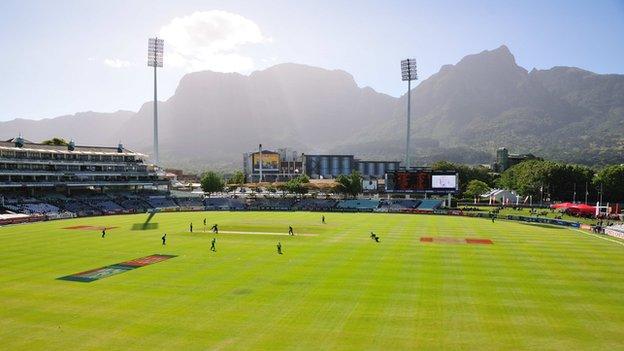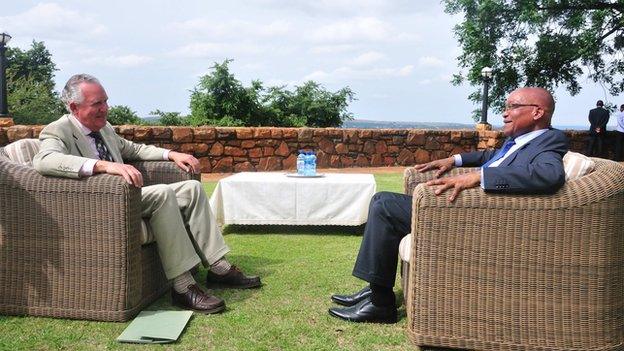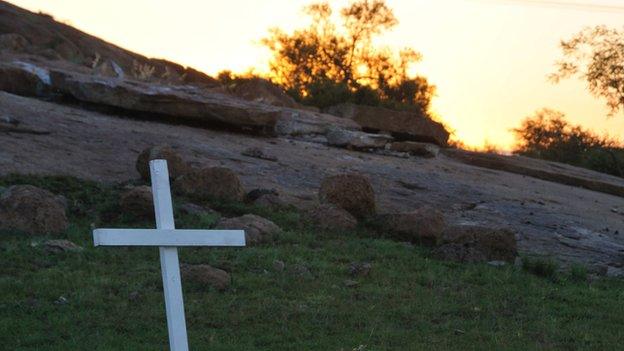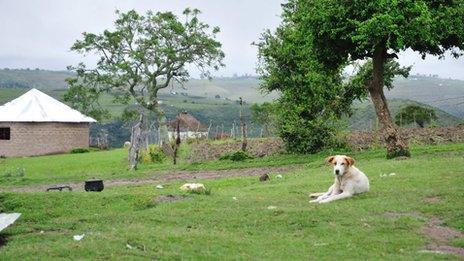Marikana mine massacre casts long shadow
- Published
Peter Hain visits the Eastern Cape
South Africa changed irrevocably when apartheid was abolished and the African National Congress came to power. But in an emotional return to the country of his youth, the British MP and former government minister Peter Hain came face to face with the bitter legacy of last year's shootings at the Marikana mine.
It was a moving homecoming.
I returned to my old school where in Pretoria, in my day in the early 1960s, apartheid decreed it was for whites only. This time, I witnessed blacks and whites, friends and students together.
I interviewed an old comrade of my anti-apartheid parents in the Supreme Courtroom, where Nelson Mandela had been on trial for his life in 1964 and where that same year a close family friend had been sentenced to death.
The emotional turmoil of those grim apartheid years coming flooding back.
I met Dikgang Moseneke who told me how, as a frightened 15-year-old on a treason charge, my mother Adelaine had comforted him by bringing him a bar of his cherished chocolate every day - until he was sentenced to 10 years on Robben Island.
He is now South Africa's acclaimed Deputy Chief Justice.

Multi-racial cricket at Cape Town's international arena, beneath Table Mountain, is symbolic of progress

But allegations of corruption are rampant and President Zuma "has a mountain to climb"

The shootings at Marikana could prove to be a "turning point" for the still-troubled country
I was thrilled to witness multi-racial cricket played at Cape Town's international arena, Newlands, Table Mountain majestic behind.
After my parents were forced to leave in 1966 for exile in Britain, I led protests in the UK to disrupt all-white South African rugby and cricket tours.
Then I could only hope and believe that this would bring about change - here at Newlands was the proof, visible all around me.
After Nelson Mandela walked to freedom from 27 years in prison, later to lead his country, he began a process of joyous transformation from evil and bitterness.
South Africa today is an amazing and beautiful country to visit, with an infectious spirit of energy and liberation.
But I was dismayed to find rampant corruption - and bitter resentment directed towards the African National Congress which freed the country but whose leaders are now widely accused, by their own supporters, of self-enrichment.
And one word came up time and again: "Marikana".
Last August's terrible police massacre of striking black miners - killing 34 and injuring 78 - symbolises a crisis facing the country.
At Lonmin's Marikana Platinum mine north-west of Johannesburg, I heard shocking stories of cold-blooded executions and torture - reminiscent of some of the worst atrocities of apartheid.
Lawyers representing families of the dead and injured told me, on the margins of an official Commission of Inquiry, that the massacre seemed pre-planned. This is denied by the police and Lonmin.
At least under the country's vibrant multi-racial democracy the truth will come out whereas under apartheid, barbarity was invariably covered up.
But it was still shocking to hear a white police ballistics expert confirm to the inquiry that the machine guns used against the defenceless miners were "weapons of war".

Many leave the impoverished Eastern Cape to find work at mines and cities
It was equally chilling to read a letter sent on 13 August 2012 - three days before the massacre - from Lonmin to the Minister of Mines, asking for the full force of the state to be brought to bear on the strikers.
I put this to the CEO of Lonmin, Simon Scott, who denied it was an appeal for violence.
The Marikana Commission will have to decide whether the killings were premeditated.
But no wonder the widows and their lawyers saw events as sinister, not simply tragic.
Walking amid rows of macabre white crosses to mark the dead, I concluded that Marikana was indeed a turning point, as former ANC government minister and struggle leader Ronnie Kasrils told me.
"I believe it's an actual watershed which the ruling party needs to understand. I feel that we have lost our way to quite a degree," he said.
"South Africa's got to re-think its economic position. If we can't find a way to deal with the needs of the workers of this country we are… facing [a] crisis."
Not only was it horrific, but the clash between the London Stock Exchange-listed company and its poor black workers suggests that - although democracy came with human rights entrenched for all - the inequalities of apartheid are unchanged.
A new, black elite has been co-opted into the white business establishment - a few even becoming billionaires.
Lonmin has just appointed a black African Chief Executive, Ben Magara. But the fundamentals of an economy run for a 9% white minority seem unreformed.
The ANC government of President Zuma has a mountain to climb - apartheid bequeathed to Mandela and his followers a harsh inheritance.
Insatiable demand for new housing means nobody could have expected enough homes to be built - though fully three million have been.
Nobody could have imagined that education could have been totally transformed from serving whites only - though the number of black children at school has doubled.
Millions have also received running water and electricity under the ANC.
Yet so much more could have been achieved if corruption hadn't become almost institutionalised, blocking proper delivery of vital services.
And this, I discovered, is what is breeding daily and country-wide community protests, in which two million people were involved last year.
Frustration recently erupted into violence at Marikana and in the stunning wine-producing valleys of the Western Cape where I also travelled.
But despite everything, I am optimistic. This is still a country with enormous natural resources, good infrastructure and long established administrative mechanisms.
Whatever the failings of its local and national leaders, most ANC policies remain admirable.
The spirit of Mandela remains strong despite his grave frailty. There is a fine constitution entrenching freedoms. Importantly, there is a vociferous parliamentary opposition and independent pressure groups demanding civil liberties, transparency and honest government.
And above all for me personally, the rainbow nation is still an inspirational star compared with the depravity and brutality of apartheid.
Watch Peter Hain MP's film South Africa: The Massacre that Changed a Nation on BBC Two at 21:00 BST on Wednesday 24 April and afterwards on the BBC iPlayer.